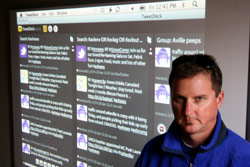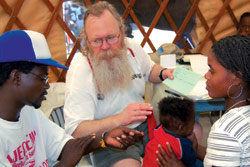Tuesday, Jan. 12: just another day in Asheville until my cell phone rumbled to life with the news of the earthquake in Haiti.
I'm the board chair for Mission Manna, an Asheville-based nonprofit working to end the ravages of malnutrition in Haiti, specifically in Montrouis and the surrounding area. The news struck me hard, taking my breath away. Initially, I was at a loss as to what to do. I wanted to be helping out in Haiti, but that wasn't possible, so I needed to find another way to channel my energy.
I'm in nearly daily contact with our staff in Haiti, mainly via e-mail, so I sat down at my desk to see if there was any good news. Nothing. Like many other NGOs, Mission Manna is also active on Twitter, exchanging information and ideas on a daily basis, so that's where I turned next. Little did I know the kind of journey I was about to begin.
As I'd hoped, my Twitter contacts on the ground in Haiti (many of whom are associated with major relief organizations such as Doctors Without Borders, the Red Cross and Partners in Health) immediately provided a wealth of information. As fast as I could, I retweeted their accounts of what was happening in and around Port-au-Prince as the hours disappeared into night.
Recalling that I still had no direct information from our staff in Montrouis, two hours east of Haiti's capital, I again checked my e-mail, hoping for news. There was nothing from our colleagues and friends but, notably, my mailbox was full of new Twitter followers, mainly major news outlets from around the globe. Twitter was where the information was, and somehow, they'd found Mission Manna. The link between Asheville and Haiti proved more solid than I could have known.
Follow the leaders
For those unfamiliar with Twitter, the idea is to "follow" people and groups with whom you share a common interest. If you follow someone, you see their "tweets" (messages); if they follow you, they also see your tweets (of 140 characters or less: Brevity is indeed the soul of Twitter). If someone you follow doesn't follow you, they're not aware of your Twitter posts unless you specifically mention them. So the more followers you have on Twitter, the more broadly your message will be shared.
This worked to Mission Manna's advantage, as we had many Haitian Twitter users who had good information but not many followers. Mission Manna had around 700 followers at the time, many well-connected with aid organizations working in Haiti, so the synergy was there for us to be helpful. We could receive information from Haiti and disseminate it to a much wider audience than our friends in Haiti could. And in the process, we could share the experience with Western North Carolina.
The importance of this broader connection didn't dawn on me right away, but I returned to Twitter, posting what I knew before finally heading for bed, weary from the process and the day's dreadful news.
The next morning, I was shocked to see the number of new followers Mission Manna had acquired overnight: We now had nearly 1,000, all told, and they weren't just the usual spammers. Instead, it was a nice mix of locals, worldwide news groups, fellow NGOs and, surprisingly, more people on the ground in Haiti. Reading the tweets that had come in overnight, I was taken aback by the gravity of the news I'd been entrusted to retweet:
"@MissionMANNA MARTINE PIERRE SENDING MSGS! SHE's ALIVE UNDER RUBBLE @ UNIVERSITE CARAIBES #loc DELMAS 29 students alive #Haiti #rescue"
"@MissionMANNA: Greek Rescue Team Confirms There'sPeople ALIVE @ Rue Centre Building Napolin. THEY NEED BACK UP. #haiti"
"@missionmanna -community hospital in need of at least 100 packets(liter) of O neg. blood. please help"
"@MissionMANNA: 2 more survivors reported alive in a school corner Canapé Vert… more detail to come. #Haiti"
"@MissionMANNA Hospital Sacre Coeur Milot 904-223-7233 904-223-7233: full-svs 2ORs, trauma & ortho team waiting 4 patients RT"
Suddenly it all made sense: With the Red Cross and others watching our Twitter feed for clues, Mission Manna could make a difference, even from faraway Asheville. For the next 10 days, this concept became the focus of my every available minute — and it continues to do so now as relief efforts move forward. I got up early, went to bed late, tweeted at lunch and in my car before I left to go home. I stopped on the side of the road to send urgent tweets; sent tweets from a Pritchard Park bench, seated next to unsuspecting tourists; and even stood on the infield at the Charlotte Motor Speedway, reaching out to those in need in Haiti.

Sobering lessons
Three days after the earthquake, Esquire magazine tweeted its list of the top three Twitter resources for reliable information out of Haiti, and Mission Manna made the list. My inbox swelled with the news of more (and pretty significant) followers, and my daily retweet routine really began to wear on me. Not just the volume of the tweets but their content: news of dead and dying babies, families ripped apart, and children left to wander in the streets. Very late one night, I sent the following tweet:
"So amazed by the power of Twitter. So weary of Twitter. #Haiti"
As the days passed, Mission Manna's roster of followers swelled to more than 1,500, and the tweets from Haiti began to evolve from rescue to relief:
"@MissionMANNA #Haiti: 2 young Haitian interpreters available. Samuel 50939179371 / Mericles 50937671464."
"@MissionMANNA Need "corporate jet" 2 transport 6 docs 2 PaP, docs R Cleveland but can fly 2 meet U. Depart:1/28 Return:2/6"
"@MissionMANNA port at Jacmel, southwest of Port-au-Prince is currently operational during dayl"
As the needs became less urgent and more long-term, I was able to dial back my schedule just a bit. Still, even 12 days into the ordeal, Mission Manna was receiving word of survivors texting their locations from the rubble, and I dutifully retweeted this info as quickly as possible.
There were also many, many messages of encouragement along the way, such as this one:
"Donate $$ to great orgs @lambifund @missionMANNA @PIH_org MOST important KEEP TWEETING #Haiti"
Others confirmed that Twitter had indeed turned into a valuable resource in the Haitian recovery operation:
"@missionMANNA love the way technology is working to mobilize aid in this tragic situation!"
We also received a lot of Twitter-based local love, most notably from Bruisin' Ales in downtown Asheville (which is making its Feb. 4 beer sampling a benefit for Mission Manna) and from The Wine Studio on Charlotte Street, which is donating the proceeds from its Wednesday-night wine tastings to Mission Manna throughout the month of February.
Meanwhile, Mission Manna was also using Twitter to send valuable information to Haiti. For example, when Haitians were thinking that an additional airstrip was being built north of Port-au-Prince, I was able to ask a military contact on Twitter to confirm. He replied with the grim news that the area was being bulldozed for mass graves. I passed this along to our Haitian followers, believing that bad news was better than false hopes.

From the first day I was dragged — kicking and screaming — into social networking and the Twitterverse, I have found it a surprisingly valuable resource for Mission Manna. But it took an earthquake for me to realize what a valuable resource Mission Manna could be for Twitter.
It was an important lesson — but one I wish I'd never had occasion to learn.
Fairview resident Todd Kaderabek is the board chair for Mission Manna. To learn more about the nonprofit and its work, visit missionmanna.org.
I stopped on the road to send urgent tweets … reaching out to those in need in Haiti.







Wow.
I did not realize it was that involved, Todd. I know you told, me, but man it must have been intense.
We can give social media and cell phones lots of credit, but they are really just tools that help us do what we as people would do anyway: help each other. These tools just help us do it better.
It’s the doing that counts. And you do it.
Thanks for all the extra efforts.
DB